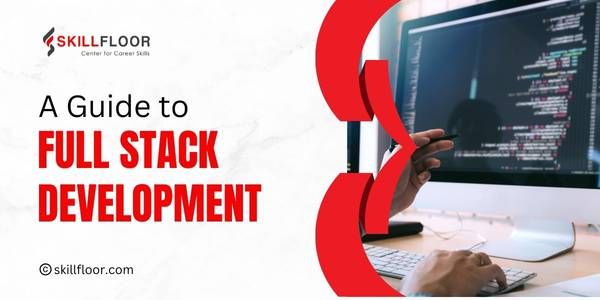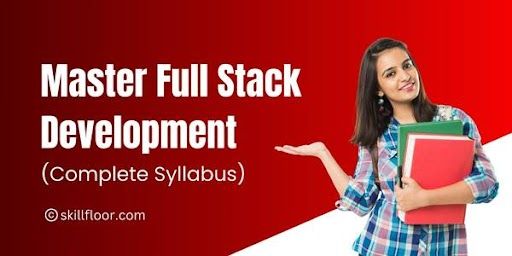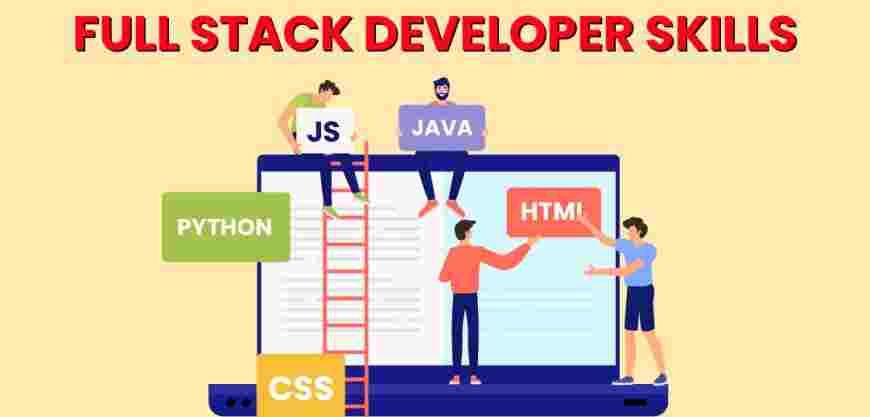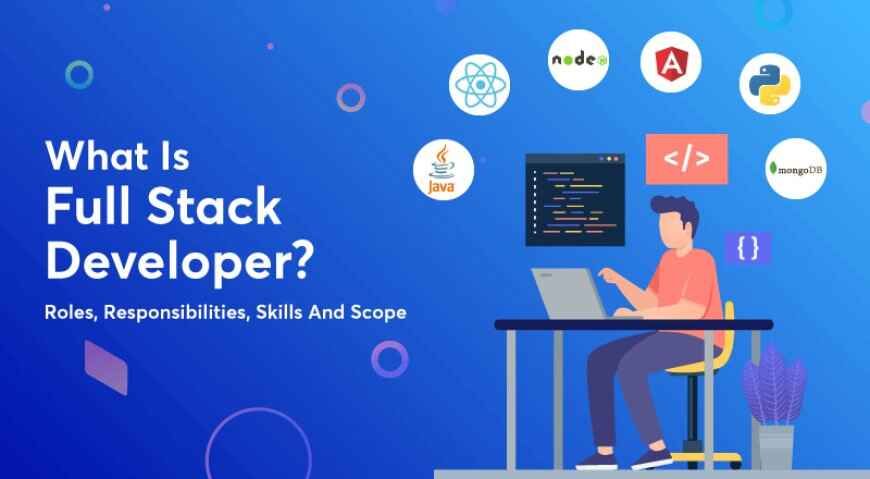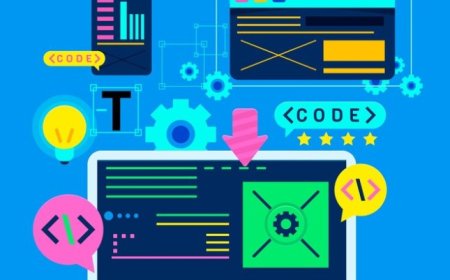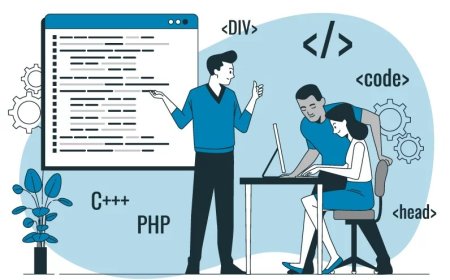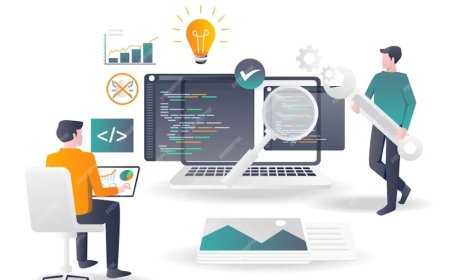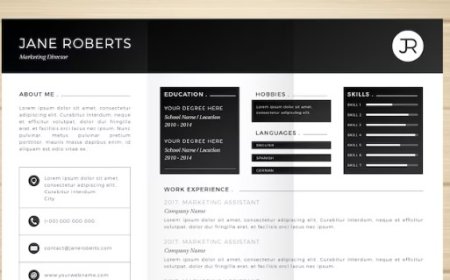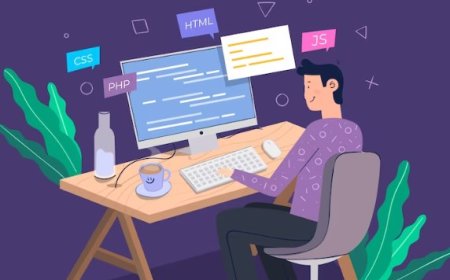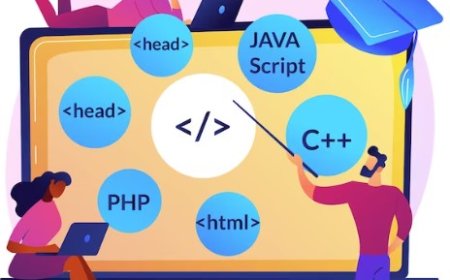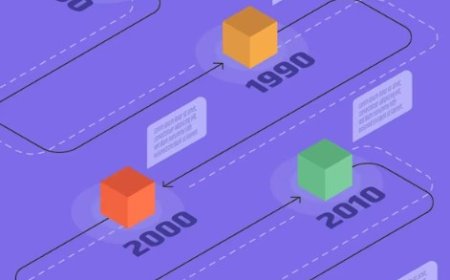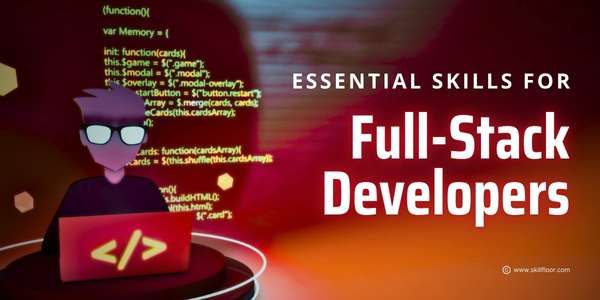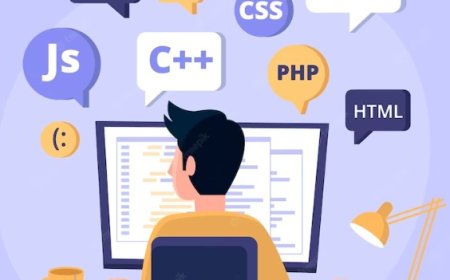TABLE OF CONTENTS:
-
What is full stack developer?
-
Different types of full stack developer
-
Skills of full stack developer
-
How to become full stack developer?
-
Is full stack developer a good career
-
Advantages of full stack development
-
Choosing the right full stack developer course
-
Choosing the right full stack developer institute
-
Resume for full stack developer
-
Full stack developer roadmap
Full stack development refers to the practice of being proficient in both frontend and backend technologies, allowing developers to work on all layers of a web application or software project. A full stack developer is skilled in frontend technologies like HTML, CSS, and JavaScript for building the user interface and user experience. They are also well-versed in server-side languages, frameworks, and databases for handling data, business logic, and server-side operations.
The role of a full stack developer involves understanding the entire software development process, from designing and implementing the user interface to developing server-side logic, managing databases, and deploying applications. They are capable of handling both client-side and server-side tasks, making them versatile and capable of taking a project from conception to completion.
Full stack development offers several advantages, including increased flexibility, as developers can handle multiple aspects of a project and adapt to changing requirements. It also promotes better collaboration among team members, as full stack developers can understand and communicate with both frontend and backend teams. Additionally, full stack developers have a broader understanding of the software development landscape, allowing them to make informed decisions and contribute to overall project architecture and design.
By embracing full stack development, organizations can streamline their development processes, reduce dependencies, and enhance productivity. Full stack developers are well-suited for startups and small teams where resources may be limited, as they can independently handle various tasks and contribute to different parts of a project.
1. What is Full Stack Developer?
A full stack developer is a professional who possesses the skills and expertise to work on both the front-end and back-end aspects of web development. They have a comprehensive understanding of various programming languages, frameworks, and technologies used in both client-side and server-side development. A full stack developer is proficient in front-end technologies like HTML, CSS, and JavaScript, and is also knowledgeable in back-end technologies such as databases, server-side programming languages (such as Python, Ruby, or Java), and frameworks like Node.js or Django.
They are capable of designing, developing, and deploying complete web applications, handling both the user interface and the underlying logic and functionality. With their ability to work on all layers of a web application, full stack developers are valuable assets for companies and organizations seeking versatile and adaptable professionals in the field of web development.
2. Different Types of Full Stack Developer
Different types of full stack developers can specialize in various technology stacks and areas of expertise. Here are some key types:
-
MERN Stack Developer: Specializes in building web applications using the MongoDB, Express.js, React.js, and Node.js technologies. They are proficient in both frontend and backend development within this stack.
-
MEAN Stack Developer: Focuses on the MEAN stack, which consists of MongoDB, Express.js, AngularJS, and Node.js. They have expertise in developing robust and scalable applications using these technologies.
-
LAMP Stack Developer: Works with the LAMP stack, comprising Linux, Apache, MySQL, and PHP. They excel in building web applications using the PHP scripting language, Apache web server, and MySQL database.
-
Ruby on Rails Developer: Specializes in using the Ruby programming language and the Ruby on Rails framework for building web applications. They are proficient in both frontend and backend development within this framework.
-
Python-based Full Stack Developer: Masters Python programming language and works with frameworks like Django or Flask for backend development. They may also have knowledge of frontend technologies like HTML, CSS, and JavaScript.
-
Java-based Full Stack Developer: Proficient in Java programming language and works with frameworks like Spring or Java Enterprise Edition (Java EE) for backend development. They may have expertise in frontend technologies like JavaScript and frameworks like Angular or React.
-
NET Full Stack Developer: Specializes in Microsoft's .NET framework for building web applications. They work with languages like C# and may have expertise in frontend technologies like HTML, CSS, and JavaScript.
-
Mobile Full Stack Developer: Focuses on developing mobile applications for both iOS and Android platforms. They are skilled in frontend mobile app development (using technologies like React Native or Flutter) and backend integration.
These different types of full stack developers demonstrate specialization in specific technology stacks, allowing them to excel in particular domains and cater to specific project requirements. Their expertise spans both frontend and backend development, making them versatile professionals in the field of software development.
3. Skills of Full Stack Developer
A full stack developer possesses a diverse set of skills in both front-end and back-end web development. They are proficient in HTML, CSS, and JavaScript for building user interfaces and creating responsive web designs. They have experience with server-side programming languages such as Python, Ruby, or Java, and are familiar with frameworks like Node.js or Django. Full stack developers have knowledge of databases and can work with technologies like SQL or MongoDB for data storage and retrieval.
They understand API integration, version control systems like Git, and have experience with deployment and hosting of web applications. Their versatility and ability to work on multiple layers of web development make them capable of designing, developing, and deploying complete web applications.
4. How to Become Full Stack Developer?
-
Learn the basics: Start by gaining a strong foundation in HTML, CSS, and JavaScript for frontend development. Understand how to create responsive web pages, style them, and add interactivity.
-
Master a backend language: Choose a backend language such as Python, Java, or PHP, and learn its syntax, data structures, and frameworks. Understand concepts like server-side scripting, databases, and server management.
-
Explore databases: Familiarize yourself with popular databases like MySQL, MongoDB, or PostgreSQL. Learn how to design, query, and manage databases effectively.
-
Gain expertise in frameworks: Become proficient in frontend frameworks like React, Angular, or Vue.js, as well as backend frameworks like Node.js, Django, or Laravel. Understand their features, architecture, and best practices.
-
Learn version control: Familiarize yourself with version control systems like Git. Understand how to collaborate with other developers, manage code repositories, and track changes.
-
Practice building projects: Start building small projects that involve both frontend and backend components. This hands-on experience will help you understand the full development process and enhance your problem-solving skills.
-
Continuously learn and update: Stay updated with the latest trends, technologies, and best practices in full stack development. Explore new frameworks, libraries, and tools to expand your skillset.
-
Showcase your work: Create a portfolio showcasing your projects and skills. Contribute to open-source projects, participate in hackathons, or build personal projects to demonstrate your abilities to potential employers.
-
Stay curious and adaptable: Full stack development is a constantly evolving field. Stay curious, continue learning, and adapt to new technologies and industry demands.
-
Gain practical experience: Seek internships, freelance projects, or entry-level positions to gain practical experience and apply your skills in real-world scenarios.
5. Is Full Stack Developer a Good Career
Becoming a full stack developer can be a rewarding career choice in today's tech-driven world. The demand for professionals who can handle both front-end and back-end development is high, as companies seek versatile individuals who can create complete web applications from start to finish. By mastering a wide range of programming languages, frameworks, and technologies, full stack developers can work on various projects and adapt to different tech stacks. This versatility offers opportunities for growth, as they can contribute to different stages of development and collaborate effectively with both front-end and back-end teams. Additionally, being proficient in multiple areas of development allows full stack developers to have a holistic understanding of the entire web development process, enabling them to identify and solve problems efficiently. Their ability to bridge the gap between different layers of a web application makes them valuable assets to organizations and opens up possibilities for career advancement and specialization.
However, it's important to note that the technology landscape is ever-evolving, so continuous learning and staying up-to-date with the latest trends and advancements is crucial for maintaining a successful career as a full stack developer.
6. Advantages of Full Stack Development
-
Versatility: Full stack developers have the ability to work on both frontend and backend technologies, allowing them to contribute to all aspects of a project. This versatility enables them to handle different tasks, collaborate effectively with team members, and adapt to changing project requirements.
-
Cost-effective: Hiring a full stack developer can be cost-effective for smaller teams or startups since they can handle multiple roles. One skilled developer with knowledge of both frontend and backend can replace the need for hiring separate specialists, reducing costs and simplifying team dynamics.
-
Efficient problem-solving: Full stack developers possess a comprehensive understanding of the entire software development process. They can identify and troubleshoot issues across different layers of an application, leading to efficient problem-solving and faster development cycles.
-
Seamless collaboration: Full stack developers can bridge the gap between frontend and backend teams. Their understanding of both sides allows for effective communication, collaboration, and smoother integration between different components of a project.
-
Faster development cycles: With the ability to work on multiple layers of an application, full stack developers can independently handle tasks, reducing dependencies and bottlenecks. This leads to faster development cycles and quicker time-to-market for projects.
-
Holistic approach: Full stack developers have a broader perspective on application development. They consider the overall architecture, user experience, and performance optimization, leading to cohesive and well-rounded solutions.
-
Continuity and maintenance: Full stack developers can provide continuity in a project's lifecycle. They can work on frontend and backend updates, perform bug fixes, and handle maintenance tasks, ensuring the smooth functioning of the application over time.
-
Seamless project transitions: Full stack developers can seamlessly transition between different phases of a project, from prototyping and development to deployment and maintenance. This reduces handover challenges and ensures a consistent development approach.
7. Choosing the Right Full Stack Developer Course
When choosing the right full stack developer course, several factors should be considered. First, look for a course that covers a comprehensive curriculum, including both front-end and back-end development, programming languages, frameworks, and relevant technologies. The course should provide hands-on projects and practical assignments to apply the learned concepts. Additionally, consider the credibility and reputation of the institution or platform offering the course. Look for reviews and testimonials from past students to gauge the quality of instruction and support.
Flexibility in terms of course format and schedule is also important, as it should align with your learning preferences and availability. Consider the mode of instruction, whether it's online, in-person, or a combination, and ensure that it offers interactive learning resources and support from instructors or mentors. Finally, factor in the cost of the course and any additional resources or certifications provided. By carefully evaluating these aspects, you can choose a full stack developer course that suits your learning needs, provides valuable skills, and helps pave the way for a successful career in web development.
8. Choosing the Right Full Stack Developer Institute
Choosing the right full stack developer institute is crucial for acquiring the necessary skills and knowledge. Look for institutes that offer comprehensive and up-to-date curriculum, covering both frontend and backend technologies.
Consider factors like the reputation and credibility of the institute, faculty expertise, industry partnerships, hands-on learning opportunities, and placement support. Research student reviews and success stories to gauge the institute's effectiveness in producing skilled full stack developers. Ultimately, choose an institute that aligns with your learning goals, provides a conducive learning environment, and equips you with the practical skills needed for a successful career in full stack development.
9. Resume for Full Stack Developer:
Creating a resume for a full stack developer can be done using the following simple and short points:
-
Contact Information: Include your full name, phone number, email address, and LinkedIn profile URL at the top of your resume.
-
Summary/Objective Statement: Write a concise summary or objective statement that highlights your experience, skills, and career goals as a full stack developer.
-
Technical Skills: List your technical skills relevant to full stack development, including programming languages, frameworks, databases, version control systems, and any other relevant tools or technologies.
-
Professional Experience: Provide a summary of your work experience, including job titles, company names, and employment dates. Highlight your responsibilities, accomplishments, and projects related to full stack development. Quantify your achievements wherever possible
-
Education: Mention your educational qualifications, including degree(s), institution name(s), and graduation year(s). If you have relevant certifications, include them here as well.
-
Projects: Showcase your notable projects, both personal and professional, that demonstrate your full stack development skills. Include project names, descriptions, technologies used, and any outcomes or results achieved.
-
Additional Sections: Consider adding sections like certifications, relevant courses or workshops attended, open-source contributions, or any other relevant information that strengthens your full stack developer profile.
-
Awards and Recognition: If you have received any awards or recognition for your work as a full stack developer, include them in a separate section to highlight your achievements.
-
References: Optionally, you can mention that references are available upon request. Avoid including specific references on your resume unless explicitly requested by the employer.
-
Formatting and Proofreading: Ensure your resume has a clean and professional format, with consistent font styles and sizes. Proofread it carefully for any grammatical or spelling errors.
Keep your resume concise, highlighting the most important information that showcases your capabilities as a full stack developer.
10. Full stack developer roadmap
The full stack developer roadmap provides a structured guide for aspiring developers to acquire the necessary skills and knowledge to become proficient in both front-end and back-end development. The roadmap typically includes several key steps.
Begin by learning the basics of web development, including HTML, CSS, and JavaScript. These front-end languages are fundamental for creating and styling web pages.
Next, delve deeper into front-end development by exploring frameworks such as React, Angular, or Vue.js. These frameworks help in building interactive and dynamic user interfaces.
Simultaneously, start learning back-end technologies, including server-side programming languages like Python, Ruby, or Java. Understand concepts such as server-side rendering, routing, and handling data requests.
To complement back-end development, gain familiarity with databases and database management systems like SQL or MongoDB. This enables storing and retrieving data effectively.
Acquire knowledge of APIs (Application Programming Interfaces) to integrate third-party services or access external data sources.
Version control systems like Git are crucial for collaborative development. Learn the basics of Git and familiarize yourself with branching, merging, and code repositories.
Broaden your understanding of web security principles and best practices to ensure the integrity and protection of data.
Finally, gain hands-on experience by working on real-world projects, which helps apply acquired knowledge and develop problem-solving skills.
Altogether, Becoming a full stack developer offers numerous advantages in the ever-evolving world of software development. With proficiency in both frontend and backend technologies, full stack developers possess versatility, cost-effectiveness, and efficient problem-solving skills. Their ability to seamlessly collaborate with different teams and transition between project phases makes them valuable assets to organizations. By continually learning and staying updated with the latest trends and technologies, full stack developers can adapt to changing industry demands and contribute to the success of diverse projects.
With their holistic approach and comprehensive understanding of the software development process, full stack developers play a vital role in creating robust and seamless web applications. Whether it's building dynamic websites, optimizing user experiences, or solving complex technical challenges, full stack developers are well-equipped to tackle the diverse demands of the industry and drive innovation forward.
Related Posts
Complete Full Stack Developer Syllabus Guide
Don't miss out on mastering full-stack development! Get a complete syllabus guid...
What Is Full Stack Developer: Essential Skills Required
Explore the role of a Full Stack Developer and discover the essential skills req...
What is Full Stack Development
Full Stack Development involves working on both the front end and back end of a ...
The Art of Debugging: Full Stack Java Developer's Toolkit
The Art of Debugging A comprehensive toolkit for Full Stack Java Developers. Lea...
Trends & Emerging Tech in Java Full Stack Development
Explore the latest trends and emerging technologies in Java Full Stack Developme...
Java Frameworks for Full Stack Development Analysis
Explore top Java frameworks for full-stack development through a comprehensive c...
Crafting an Impressive Resume for a Full Stack Developer
Unlock limitless possibilities as a full stack developer. Craft an impressive re...
Is Full Stack Development a Good Career Choice
Discover the future of full stack development as a career choice. Explore the ul...
Finding the Perfect Full Stack Developer Course Guide
Discover the best full stack developer course for your learning journey. Find th...
The Journey to Becoming a Full Stack Developer
Unlock your potential as a full stack developer. Embark on a limitless journey o...
Choosing the Right Full Stack Developer Institute Guide
Discover the future of full stack development with our comprehensive guide. Find...
Full Stack Developer Roadmap: Navigating Your Journey
Unlock boundless opportunities as a Full Stack Developer. Master front-end, back...
Advantages of Full Stack Development: Versatility & Eff...
Unlock versatility and efficiency with full stack development. Future-proof your...
Full Stack Developer Skills Every Professional Needs
Essential full stack developer skills, from front-end frameworks to back-end pro...
The Full Stack Developer: The Superpowers of the Tech W...
Unlock the future of tech with the Full Stack Developer, armed with superpowers ...
The Full Stack Spectrum: Meet Friendly Developers
Discover the future of full stack development with our friendly neighborhood dev...















































